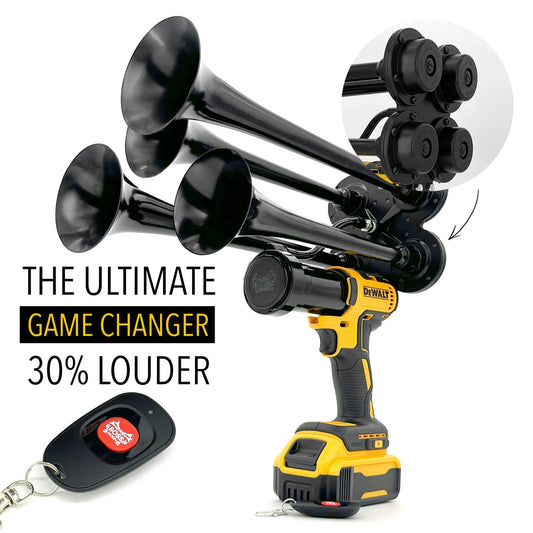Did you know that train horns are required by law to be sounded in certain situations to ensure safety? Train engineers are required to sound the horn at designated crossings to alert pedestrians and vehicles of their presence. However, in recent years, there has been an increase in complaints about trains honking excessively, even outside of these designated areas. This has raised concerns among residents living near train tracks who are disturbed by the noise pollution.
The history of train horn regulations dates back to the late 19th century when the Railroad Safety Appliance Act was passed in response to numerous train accidents. The act required trains to be equipped with audible warning devices, such as horns, to prevent collisions. While the intent was to enhance safety, the frequency and duration of train horn usage have become a source of annoyance for many communities.
One potential solution to address the issue of excessive train honking is the implementation of quiet zones. Quiet zones are designated areas where trains are not required to sound their horns, provided that certain safety measures are in place, such as enhanced crossing gates and signage. These zones aim to strike a balance between safety and noise reduction, offering relief to residents without compromising on safety.
According to a study conducted by the Federal Railroad Administration, excessive train horn noise can have negative impacts on both physical and mental health. Prolonged exposure to loud noise can lead to hearing loss, increased stress levels, and sleep disturbances. This highlights the importance of finding a solution to minimize unnecessary train horn usage while still ensuring the safety of communities along railway tracks.
Have you ever wondered why trains honk so much? Trains honk for safety reasons, to alert pedestrians and vehicles of their presence as they pass through intersections, crossings, and tunnels. The loud horn is a crucial warning signal for preventing accidents and ensuring the safety of everyone around the train tracks. Additionally, train conductors use the horn to communicate with other trains and railroad workers. Stay tuned to learn more about the importance of train honking and how it plays a vital role in railway operations.
The train honks its horn for safety purposes, to alert pedestrians and other vehicles of its presence. This is especially important at railway crossings, where people and vehicles may be crossing the tracks.
**Safety Regulations**
Trains are required by law to sound their horn when approaching a railway crossing to warn pedestrians and vehicles of their imminent arrival. This is to prevent accidents and ensure the safety of everyone in the vicinity.
**Visibility**
Trains are large, heavy vehicles that require a significant amount of time and distance to come to a stop. By honking their horn, trains increase their visibility to other road users and reduce the risk of collisions.
**Communication**
Train horns are also used as a means of communication between train operators and railway workers. Different horn patterns are used to convey various messages, such as warning of an emergency or signaling to other trains on the tracks.
**Noise Pollution**
While train horns are necessary for safety reasons, they can also contribute to noise pollution in surrounding areas. Some communities have implemented quiet zones, where train operators only sound their horn in emergency situations to reduce the impact on residents.
**Statistics**
According to the Federal Railroad Administration, train accidents at railway crossings have been on the decline in recent years. In 2019, there were 1,798 collisions at railway crossings in the United States, resulting in 236 fatalities and 798 injuries. By raising awareness about the importance of train horns for safety, we can continue to improve these statistics and prevent accidents from occurring.
https://youtube.com/watch?v=KC21OwxV_KY
What is the reason behind the frequent horn sounds on the train?
The train's horn is a crucial safety measure that alerts pedestrians and motorists of its presence. It is essential for the train to blast its horn when approaching crossings, tunnels, or stations to prevent accidents and ensure everyone's safety. Additionally, the horn serves as a communication tool between the train and its surroundings, signaling its movements and intentions.
- The train's horn is a safety measure to alert pedestrians and motorists.
- It is crucial for the train to blast its horn at crossings, tunnels, and stations.
- The horn serves as a communication tool between the train and its surroundings.
Why does the train honk so loudly at night?
Trains are required to sound their horns with increased volume at night to compensate for reduced visibility and heightened risks. The louder horn ensures that people in the vicinity are alerted to the train's presence due to dim lighting conditions. Moreover, the amplified noise serves as a warning mechanism to prevent potential hazards in the darkness.
- Trains honk loudly at night to compensate for reduced visibility and heightened risks.
- The louder horn ensures that people are alerted to the train's presence in dim lighting conditions.
- The amplified noise serves as a warning mechanism to prevent potential hazards in the darkness.
Is there a specific schedule for the train's horn blasts?
While trains do adhere to certain guidelines regarding horn usage, the schedule for horn blasts can vary based on specific circumstances. Factors such as the train's speed, proximity to crossings, presence of obstructions, and other safety considerations influence the frequency and timing of horn blasts. It is crucial for trains to adapt their horn usage dynamically to ensure optimal safety.
- Trains follow guidelines for horn usage but adjust based on specific circumstances.
- Factors such as speed, proximity to crossings, and safety considerations influence horn blasts.
- Dynamic adaptation of horn usage is crucial for ensuring optimal safety.
How do engineers determine when to sound the train horn?
Train engineers are trained to assess various factors when determining when to sound the horn. They consider the train's speed, visibility conditions, upcoming obstacles, and the presence of pedestrians or vehicles near the tracks. Engineers must exercise judgment to determine the appropriate timing and intensity of horn blasts to enhance safety and operational efficiency.
- Train engineers assess factors such as speed, visibility, obstacles, and nearby traffic.
- Engineers must exercise judgment in determining the timing and intensity of horn blasts.
- The goal is to enhance safety and operational efficiency through strategic horn usage.
Can the train's horn be less intrusive without compromising safety?
Efforts are underway to develop quieter horn technologies that maintain safety standards while minimizing noise pollution. Advanced horn systems with directional sound projection and varying frequencies are being researched to reduce the impact of train horns on surrounding communities. These innovations aim to strike a balance between safety requirements and environmental considerations.
- Research is focused on quieter horn technologies that maintain safety standards.
- Advanced horn systems with directional sound projection are being developed.
- Innovations aim to strike a balance between safety requirements and environmental considerations.
Conclusion
The train is honking so much because it is required by railway regulations to do so. Honking helps alert pedestrians and vehicles of the approaching train, preventing accidents and ensuring safety. Additionally, the train may honk more frequently in certain situations, such as when passing through intersections or approaching stations. While the constant honking may be bothersome to some, it is a necessary safety measure that should be respected and understood by all.














